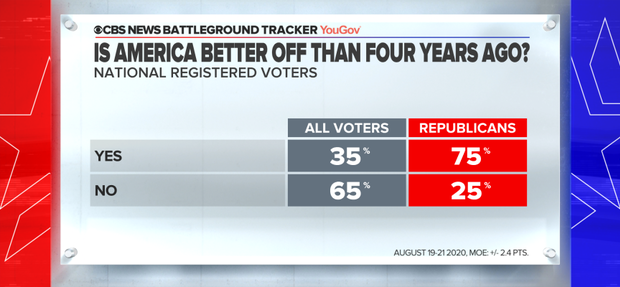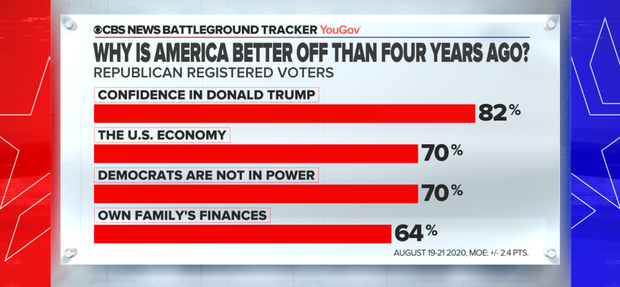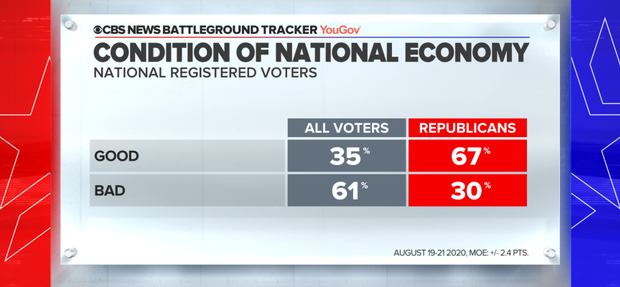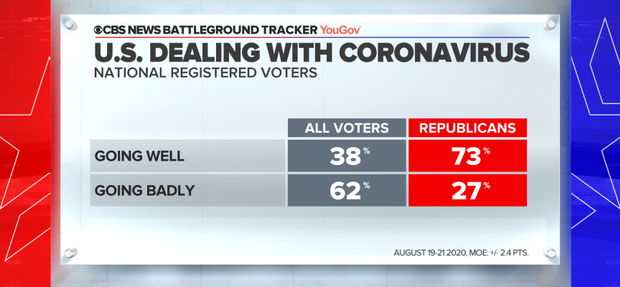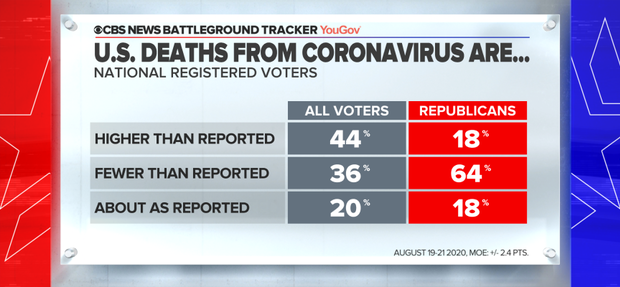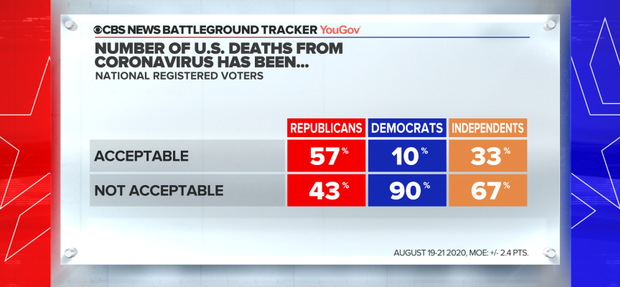There is good news for former Vice President Joe Biden when it comes to younger voters. He's no longer underperforming where Hillary Clinton ended up in the final 2016 polls.
The big question coming out of the Democratic National Convention is whether they'll actually start to like him. Going in, young voters still didn't like Biden, which leaves him susceptible to some of these voters potentially not turning out to vote in the fall.
Biden, at this point, holds a more than 20-point lead with young voters in live interview polls taken in August. Biden's up by 25 points among 18-29 year-old voters in an average of the most recent CNN/SSRS, Fox News and NPR/PBS NewsHour/Marist College polls. It's a 24-point lead if we look at 18-34 year-olds in the CNN/SSRS, Monmouth University and NBC News/Wall Street Journal polls.
Young Millennials and the oldest of Gen Z now able to vote for the first time in a presidential contest clearly prefer Biden. They just dislike him. So will they actually vote?
The answer, historically, is no.
Biden's net favorability (favorable - unfavorable) rating averages out to be -4 percentage points among the 18-29 year-old subset. That's actually about 5 points worse than his net favorability with all registered voters in those polls. If we expand out to 18-34 year-olds looking at data from CNN, Gallup and Monmouth, Biden's net favorability remains negative.
Indeed, the difference between vote choice and net favorability among young voters is striking. Biden's running about 30 points better against Trump in the horserace than his net favorability alone would suggest. Again, if we add more data from July, the point stands.
Compare what's going on with young voters to 65 years old and older. They give Biden a net favorability rating of +10 points in an average of ABC News/Washington Post, CNN, Fox News and Monmouth polls. The same polls have Biden ahead of Trump by 9 points with this group. That is, there's no statistical difference.
Senior citizens like Biden, and they're voting for him.
What's going on with younger voters is pretty simple: They're voting for Biden because they really don't like Trump. His net favorability with those under the age of 30 averaged -40 points in these same polls, or about 35 points worse than Biden's net favorability rating.
It's difficult to imagine Trump gaining too much among younger voters going forward. They know who he is after about 3.5 years of his presidency.
The potential pitfall for Biden is that voters who like neither candidate are much less likely to be enthusiastic about voting. In CNN's last poll, only about 10% of those who did not have a favorable opinion of either candidate said they were enthusiastic about casting a ballot in the fall elections. Among those who had a favorable view of at least one of the candidates, about 60% were enthusiastic about voting in the fall.
Of course, enthusiasm about voting is not the same as actually voting. You can vote without being enthusiastic about the idea, though the two are linked.
An ABC News/Washington Post poll from late May (the latest I could attain the raw data file for) drives home the point. Voters who had a favorable view of either of the candidates were 20 points more likely to say they were certain to vote than those who liked neither.
Not surprisingly, younger voters are also less enthusiastic to vote and say they are less certain to vote than older voters in November, which follows historical precedent. The question is whether they'll make up a smaller percentage of the electorate than they usually do given they don't really like either candidate on the ballot.
We just don't know. Still, this data does show the potential problem of Biden relying on young voters disliking Trump as the mechanism for getting them to vote for Biden in November.
Younger voters hate Trump, but they don't give a damn about voting for Biden (or anyone), either. And cajoling them doesn't work. Obama got through to them in record numbers, but he's the exception that proves the rule.
Enten also adds that Black voters remain key to Democrats' chances of winning this fall, a "of course" moment but one that continually needs spelling out for some.
Biden will take any help he can get with Black voters.
So far this month, there have been five live interview polls for which I could attain a Black voter crosstab: ABC News/Washington Post, CNN/SSRS, Fox News, Marist College/NPR/PBS NewsHour and NBC News/Wall Street Journal. While none of the polls individually have a sample size to be too reliable, aggregated together they tell a pretty clear story.
Biden is ahead among Black registered voters by 67 points on average and 71 points in the median of these polls. That's a sizable advantage.
It's actually slightly less though than the 75-point lead he had with Black registered voters when I looked at the average of polls taken in late May through mid-July. While we can't be sure that Biden's actually doing worse with Black voters than he had previously, given sample size restrictions, it's quite clear he isn't doing better than he was earlier in the summer. As far as I can tell, Biden's lead with Black voters is currently at one of its lowest levels of the 2020 campaign.
More interestingly, his support among Black voters is quite clearly smaller than Clinton's 79-point margin in the final registered voter polls of 2016.
An 8-point shift among Black voters (i.e. moving from a 79-point win for the Democrats to a 71-point win) could be a huge deal if applied to the swing states. It could shift the overall margin in a number of states (like Michigan and Florida) by a point. Remember Clinton only lost Florida by a little more than a point and Michigan by just 0.2 points.
The proliferation of by-mail voting may help with both Black voters and young voters, and that's why Trump wants to get rid of it.
Still, there are just too many factors going into November to be confident about that 9-point Biden lead though. We'll see. The Trump Regime is already trying to create a "miracle cure" for COVID-19 and there's still 10 weeks to go...
My advice as always: get your ballot requested and in as soon as you can. Kentucky's online voting ballot request portal went live this weekend.
Vote like your country depends on it, because it does.
